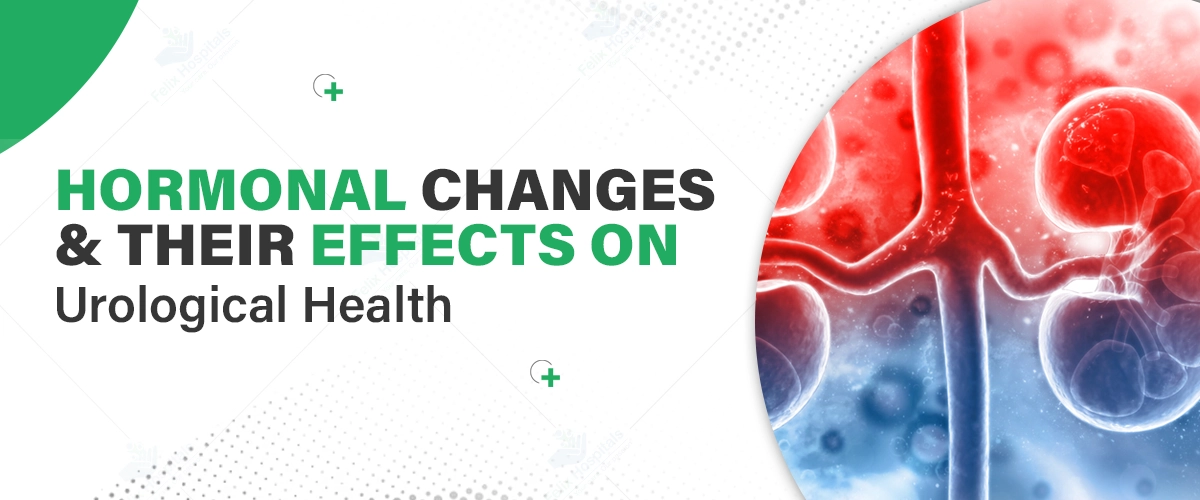
Subscribe to our

Hormones are the chemicals that regulate various bodily functions in both men and women. Any imbalance can significantly affect overall health, especially the urological system, which governs bladder, kidney function, as well as the reproductive organs. Whether it is due to old age, pregnancy, menopause, or some other medical reasons, hormonal shift can cause urological disorders such as urinary incontinence problems, infections, and kidney problems. However, if the relationship between hormonal shift and urological health is well understood and timely addressed, future complications related to kidney and overall health can be prevented.
So if you are facing any changes in your urological health or imbalance in your hormones, consult Felix Hospitals, Noida. We are the best hospital for hormonal imbalance treatment in Delhi-NCR region.
Hormones regulate many physiological activities, ranging from metabolism, mood, sexual health, reproductive health, and urinary function. Any hormonal imbalance in our body can affect our urological health in many ways. For example, the decline of estrogen in women during menopause can weaken the pelvic muscles, thus increasing the chance of urinary incontinence. Similarly, the hormonal levels of testosterone in males can affect prostate health and lead to urinary obstruction.
Other hormones, such as cortisol and aldosterone, also significantly affect kidney function and fluid regulation. When these hormone levels are disrupted, they can lead to kidney disease or chronic urinary tract infections (UTIs). Therefore, by understanding how these hormonal changes impact our body helps us to maintain urologic health.
Adrenal Hormones: Cortisol and other hormones of the adrenal glands are associated with the process of stress mechanisms and fluid balance. They affect urinary output and function.
Testosterone: This hormone is linked with male sexual activity, but has strong effects on the kidneys as well. Low levels may lead to a decrease in libido, and even frequency/urgency pertaining to urination.
Estrogen: A drop in the levels of this hormone during menopause may cause incontinence, vaginal dryness, and heightened susceptibility to UTIs.
Progesterone: This hormone is associated with menstrual cycle and pregnancy. Any imbalance in this hormone will affect the bladder and can cause problems with urination.
Hormonal change that affects urological health can be caused by the following changes in our life cycle:
Menopause: Decreased levels of estrogen affect the strength and elasticity of pelvic tissue.
Pregnancy and Postpartum Changes: Changes in progesterone and estrogen, combined with physical stress, can weaken the ladder's control.
Andropause in Men: Depletion of testosterone can make the prostate gland enlarged and cause bladder problems.
Hypothyroidism or Hyperthyroidism: Thyroid disorder influences renal functionality
PCOS (polycystic ovary syndrome): Hormonal disorder often causes problems related to kidney, and urinary infections.
Chronic Stress: The elevated level of cortisol affects kidney functioning along with fluid retention
Obesity: The extra amount of fat in the body disturbs hormonal functions, which can add to urinary problems, among other health ailments.
The common symptoms arising from hormonal imbalances include:
If any of these symptoms persist, getting an appointment with a urologist is crucial to determine the underlying cause.
Diagnosing urological conditions associated with hormonal changes requires a holistic approach. These assessments help doctors plan the treatment.
Early treatment of urological health and hormonal imbalance ensures better results, thereby decreasing the risk of complications such as CKD or irreversible bladder damage. Depending on your symptoms and diagnosis, your Urologist will plan a course of treatment that is well-suited to your specific problem.
Preventive measures can greatly reduce the risk of urological problems associated with hormonal shifts. These include:
At Felix Hospitals, the best hospital for hormonal imbalance in Noida, we provide specialized attention to issues related to the urogenital system and hormonal imbalances. Our team of highly experienced urologists include Dr Bhanwar Lal Barkesiya. The team of urologists and endocrinologists collaborate to provide comprehensive care in diagnosis, treatment, and prevention of urologic and hormonal problems. Whether you need attention for menopause-bladder problems or prostate concern, our state-of-the-art facilities ensure that you get personalized yet compassionate care.
So, do not let hormonal imbalances affect your quality of life. If you are looking for the best doctor for hormonal imbalance treatment in Noida, then book an appointment at Felix Hospitals today!
Hormonal changes are a part of life. Understanding the causes, symptoms, and available treatments can make individuals take proactive steps towards managing their urology health effectively.
Q1- Can hormones cause urinary frequency?
ANS: Yes, hormones are related to lower urinary tract symptoms, such as frequency, urgency, nocturia, and recurrent infection.
Q2- Do hormonal changes cause urological problems in men?
ANS: Yes, decreasing testosterone levels can cause prostatic enlargement and urinary troubles in men.
Q3- Can stress cause frequent urination?
ANS: Yes, chronic psychological stress can result in urinary frequency, urgency, incontinence, and pelvic pain.
Q4- How often should the hormone levels be tested?
ANS: Hormones need regular check-up, more importantly during transitional periods like menopause, pregnancy, or andropause.
Q5- What treatments are available at Felix Hospitals for urological issues?
ANS: Felix Hospitals is the best hospital for hormonal imbalance treatment in Noida. We offer a range of treatments, including hormone therapy, medication, lifestyle counseling, and advanced surgical options for urological issues.